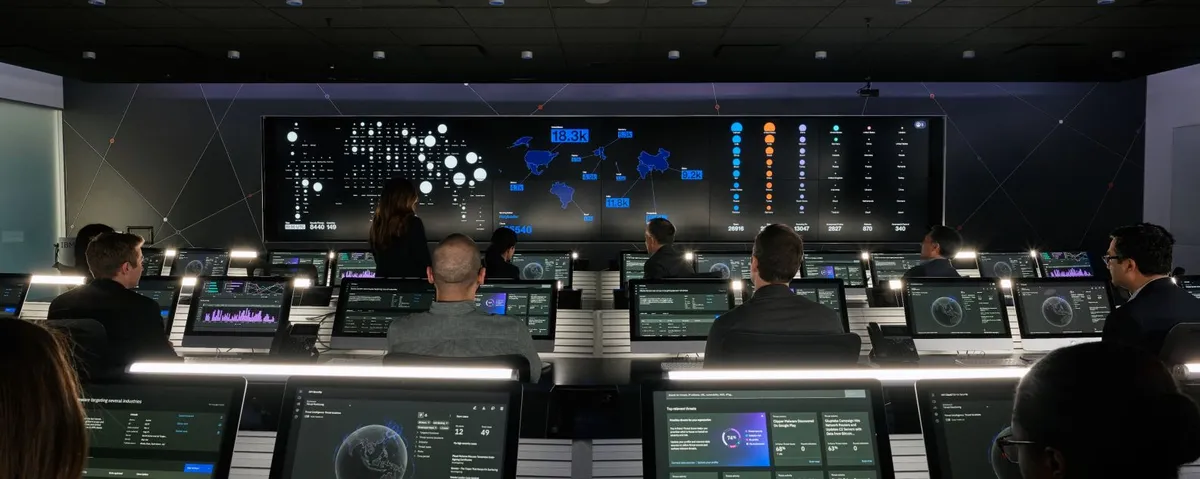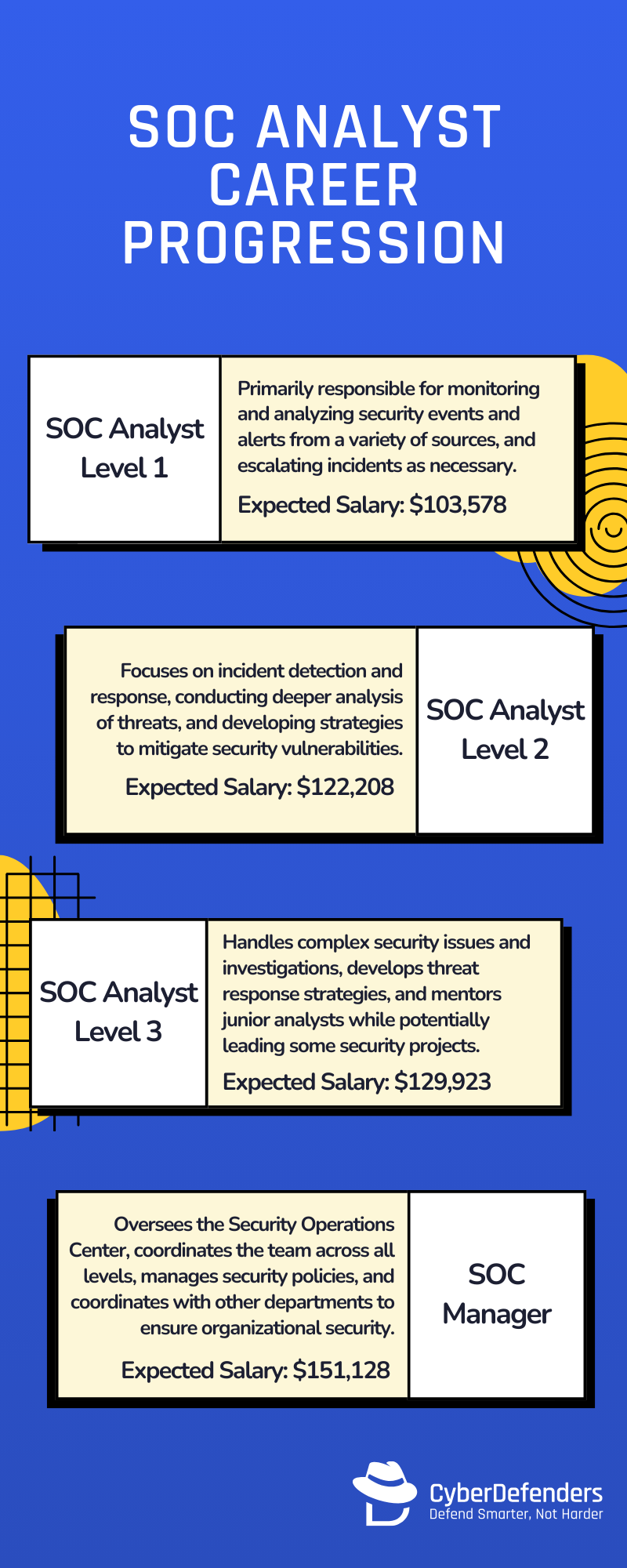Best SOC Analyst Training and Certifications

As demand for SOC Analyst positions increases, differentiating yourself through high-quality SOC Analyst training and certifications has never been more vital for your success.
With the virtual battlefield for cyber attacks expanding, the SOC Analyst’s role has become even more essential for organizations as they fortify their digital perimeter through monitoring, detecting, and responding to cyber incidents.
This in-depth guide will explore what it takes to become a professional SOC Analyst, the certifications indispensable for career growth, essential salary insights, and snippets from real-life success stories.
What is a SOC Analyst?
A SOC Analyst is the first line of defense for an organization. SOC Analysts monitor an organization’s network round-the-clock and investigate any potential security incidents. [Wikipedia]
Higher-tier analysts perform proactive threat hunting, identifying potential threats before they escalate. Exceptional communication skills are a must for SOC Analysts, as they often have to document and report security incidents with clarity and precision.
Importance of Training and Certifications
Comprehensive training is essential for SOC Analysts to hone their skills and stay ahead of the rapidly evolving threat landscape. Certifications validate your expertise and help you stand out from the crowded job market.
Additionally, pursuing SOC Analyst certifications provides a structured learning path, equipping professionals with industry-standard tools, methodologies, and best practices. These certifications are a tangible testament to your mastery of critical skills like log analysis, incident response, threat hunting, and vulnerability assessment.
Read also: Top SOC Analyst interview questions and answers in 2024
What Certifications Do You Need to Become a SOC Analyst?
The cybersecurity certification landscape is vast, with options
tailored for different levels of experience and expertise. Here’s a
curated list of recommended certifications for SOC Analysts at various
stages of their careers.
| Certification | Exam format | Cost | Expiration | Focus |
| CompTIA Network+ | Maximum of 90 questions, 90 minutes, includes performance-based questions | $2,299 includes training and 2 exam vouchers | Valid for 3 years | Covers attacks, threats, and vulnerabilities; architecture and design; implementation; operations and incident response; governance, risk, and compliance |
| CompTIA Security+ | Maximum of 90 questions, 90 minutes, includes performance-based questions | $2,499 includes training and 2 exam vouchers | Valid for 3 years | Covers attacks, threats, and vulnerabilities; architecture and design; implementation; operations and incident response; governance, risk, and compliance |
| CyberDefenders Certified CyberDefender (CCD) | 48-hour hands-on 100% practical exam | $800 includes training and 2 exam vouchers | Does not expire | Covers SecOps fundamentals, perimeter defense, incident response, digital forensics, threat hunting, and malware analysis |
| GIAC Security Essentials (GSEC) | 106 questions, 4 hours, minimum passing score of 73% | $8,525 includes training and 1 exam voucher | Valid for 4 years | Covers access control, cryptography, defensible network architecture, incident handling, Linux, Windows, and more |
SOC Analyst Salary Insights
According to Glassdoor, a SOC Analyst Level 1 in the United States makes approximately $103,578.[Glassdoor] Naturally, the earning potential varies significantly based on geographical location and experience. Professionals holding advanced certifications tend to command higher salaries.
However, one thing is for sure: the demand for qualified SOC analysts continues to rise, with organizations willing to pay a premium to trained professionals who can ensure digital safety.
SOC Analyst Career Progression
Landing your first SOC Analyst Level 1 position is a significant milestone in your cybersecurity career, but it’s just the beginning of a dynamic and rewarding pathway.
Progressing through Level 1 to more advanced roles such as SOC Analyst Levels 2 and 3, where you’ll face greater challenges, manage more complex incidents, and take on leadership responsibilities.
Read also: What is a Cyber Range?
The ultimate goal for many in this field is to become a SOC Manager, overseeing the entire security operations center, strategizing the organization’s defense mechanisms, and leading a team of talented analysts.
Each step up the ladder promises not only a higher salary bracket but also the chance to make a more significant impact on your organization’s security posture, ensuring its resilience against evolving cybersecurity threats.

Read also: Blue Team vs. Red Team in Cybersecurity: Roles & Skills
Real-Life Success Stories
Beer Varakorn’s journey from a passionate blue teamer to a Senior Cybersecurity Consultant is a testament to the transformative power of certifications like the Certified CyberDefender blue team certification. As a child, he was fascinated by movies about hackers, which led him to pursue a cybersecurity career driven by a desire to protect computer systems.
This interest evolved as he sought more challenging roles beyond his early career in a Security Operation Center. The turning point came when Beer discovered platforms like CyberDefenders, where he could enhance his practical skills through hands-on blue team labs. His commitment propelled him to the top of the leaderboard, achieving the #1 rank in Thailand and even globally on CyberDefenders at some point.
Achieving the Certified CyberDefender certification marked a significant milestone in Beer’s career. This enabled him to transition from traditional security operations center roles to a senior security consultant. Beer’s success exemplifies how targeted training and certification can elevate a professional’s capabilities and open new career pathways.
Jump into SOC Analyst Training and Certifications
The field of cybersecurity is constantly changing and presents many opportunities. By obtaining relevant certifications and training, you can prepare yourself not only for the current challenges but also for unexpected threats that may arise in the future.
Start your journey toward a SOC Analyst position on the CyberDefenders blue team training platform. Earn the Certified CyberDefender Certification and fast-track your career in cybersecurity.
References:
- Wikipedia: https://en.wikipedia.org/wiki/Security_operations_center
- CompTIA Network+: https://www.comptia.org/certifications/network
- CompTIA Security+: https://www.comptia.org/certifications/security
- GIAC GSEC: https://www.giac.org/certifications/security-essentials-gsec/
- Glassdoor: https://www.glassdoor.com/Salaries/soc-analyst-salary-SRCH_KO0,11.htm